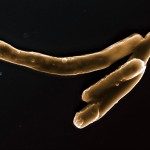Link to Pubmed [PMID] – 12874349
Infect. Immun. 2003 Aug;71(8):4684-90
Lipids that are found only in the cell envelope of pathogenic mycobacteria, such as those containing multiple methyl-branched fatty acids, have long been thought to play a role in pathogenesis. Among these complex lipids, sulfolipids have been the most extensively studied over the last 50 years. The numerous biological effects exhibited by purified sulfolipids on phagocytic cells led to the idea that these molecules are probably important virulence factors facilitating the intracellular survival of Mycobacterium tuberculosis. However, definitive evidence to support this concept has been lacking. The recent construction of an isogenic sulfolipid-deficient mutant of M. tuberculosis H37Rv (Sirakova et al., J. Biol. Chem. 276:16833-16839, 2001) has for the first time provided the opportunity to directly assess the contribution of these complex lipids to pathogenesis. In the present study, we show that against all expectations, sulfolipid deficiency does not significantly affect the replication, persistence, and pathogenicity of M. tuberculosis H37Rv in mice and guinea pigs or in cultured macrophages.

